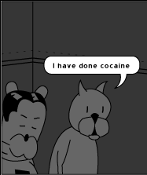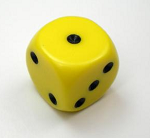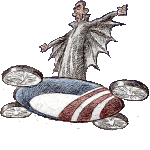|
Black August posted:Oh I already got it all sorted and stuff, yeah. I meant for sharing with us Aniodia posted:So, inspired by the discussion on Pokemon and tabletop RPGs (or at least, as much as I was able to read at around 4:30-5 pm today before my phone cut out), I'd written down a few ideas on the back of a napkin at the weekly local Pokemon TCG league. Now, it's definitely in need of hammering out quite a bit more, but even this very basic seedling of an idea was fairly well received, even among some of the other non-Pokemon players at the FLGS tonight. It's kinda inspired by the one comment mentioning Sentinels of the Multiverse, at least in terms of individual Trainers having their own decks, as well as the environment having it's own deck, but there's definitely a lot of work that remains to be done. However, I'll share what I've got so far, in case anyone wants to try it out, playtest a few battles, etc. Reminds me of discussions we've had before about a Yugioh RPG that would use a simplified version of the actual card game for it's primary combat system
|
|
|
|

|
| # ? Jun 11, 2024 16:20 |
|
Maxwell Lord posted:I dunno, see, all those things are different in theory, but in practice pretty much all the Star Wars movies are people chasing each other and shooting lasers and brandishing light swords, with the occasional spaceship fight thrown in. It's all basically Flash Gordon stuff, you chase down the Imperial operative through the treacherous crystal mines of Kirosh, you find a way across the gorge on the jungle world of Mij so you can escape the rampaging Snake Dragon, the Sith bodyguards meet you in combat on an exploding space station, etc. It's very much a mash-up of different things, too, in the first movie alone you have the smuggler and you have the Jedi teacher and you have the princess trying to get the stolen plans to the Rebels, which is why I'm not keen on FFG's division of concepts- like, all those things are part of the story, if you make it just military sci-fi or just Jedi poo poo you lose something IMO. I agree with this and I think you could make a solid PBTA out of leaning into the pulpy space fantasy angle but that would be the fiction you're trying to emulate: down-to-earth heroes vs. over-the-top villains, mystical powers of good and evil, etc. So many hacks assume "playbook" equates to "class" when really you need to cut it the other way. Like, instead of "Jedi" and "Pilot" you have a "grizzled old veteran" playbook which would be Obi-Wan in ANH but Han in TFA.
|
|
|
|
Yeah, 'Change your playbook' advances would be pretty rad if your playbooks are things like Untrained Novice, Mystical Adept and Crazy Hermit.
|
|
|
|
Warthur posted:The counterargument to this is that you can write a complete summation of the rules of poker without mentioning bluffing at all (or, if you want your statement of the rules to be really exhaustively complete, simply mentioning that nobody at the table is under any obligation to truthfully declare their feelings about their hand)... but bluffing is the heart of poker, and if you tried playing poker without bothering to bluff (on the basis that there's no rules for bluffing so clearly it's not important) you'll have a miserable time. It is possible to design a game where the mechanics don't describe what the game is specifically about so much as they set the parameters of a space where the actual game takes place, largely based on challenging the actual skill of the players themselves rather than the skills of the characters. Writing down the rules to poker without including the rules for bluffing only seems plausible because it's a 200+ year old game that's endemic to the western world that itself evolved out of older games that also included bluffing. If you want to see how important writing down your hidden information rules is, play BSG without properly explaining that section which yes is indeed written down in the rule book and permeates every mechanic. Also this doesn't really work as an analogy to the case at hand because bluffing occurs simultaneously with and is heavily integrated into the betting and dealing rules. The entire game facilitates bluffing, so those sections are also about bluffing. It would be more akin to a system where you're told to use a full game of texas holdem (with bluffing) to resolve slapping the waiter, while "see who is using the wrong spoon as societal leverage to help sway people to your side over whether or not the Duke of Hassingstoke is shtupping the maid" is filed under "I dunno, draw and compare highest? Hang on the help is escorting Dave's character out of the building and the grappling rules say it's cribbage time". e: auto correct problems and run on sentences Splicer fucked around with this message at 10:24 on Oct 25, 2019 |
|
|
|
01011001 posted:I haven't used InDesign so bearing in mind that grain of salt: I love it so far and I appreciate the one-time pricing model. Only thing was I couldn't figure out how to export TOC entries as PDF bookmarks but I haven't tried exporting for a few months now so maybe that's in (and if it's not, I found a command line thing that does it just fine so whatever). Ooh, want to share with the class?
|
|
|
|
I don't really know where Escape Rooms fall in to the forums but was wondering if anyone could share experiences, particularly bad ER experiences, whether it was lovely group dynamics or poor puzzle designs. Good ones too if notable
|
|
|
|
Nickoten posted:I think the other element to D&D not being a particularly talky game as written is, qualitatively speaking, the mechanics for talking are designed to be something you can bypass entirely via dice rolls if you want. But combat requires you to make a number of tactical decisions that the game doesn’t allow you to just skip. You can’t just make a simple check to auto play combat like you can with talking. Ilor posted:The counter-counterargument is that you can also write a complete summation of the rules of poker and never mention betting. quote:Further, any rules around betting are specific to the table at which the game of poker is played and often vary wildly by tournament format and venue. Absent betting, bluffing isn't a thing because there's absolutely no downside to playing out the entire hand. On the other hand, I am not sure that this is actually an argument against my point. I am saying "Sometimes the point of a game isn't the thing it expends the most word count on providing a rules structure for, but the emergent gameplay which arises around that rules structure in the gaps where the rules don't exist." You seem to be saying the same thing. quote:I would argue that bluffing is emergent play as a result of the rules associated with betting rather than of the game of poker itself. Don't believe me? Apply betting to any game where the outcome of a particular conflict is based upon players having different and incomplete information and I strongly suspect that bluffing will emerge. quote:Most role-playing books never say anything about speaking in character or doing accents or voices or gestures or facial expressions either. But there's a pretty big difference between "not telling people how to role-play" and "not having rules to support a particular action." If there is no mechanic to define stealth or sneaking, a character concept based on being sneaky is going to rely solely on GM fiat to be effective. And with that being the case, we can't really say the game is "about" being sneaky. A lot of role-playing games devote scads of page space to fighting or casting spells, but devote little or nothing to being persuasive or intimidating. What social interaction is there is again almost always the result of GM fiat. Sure, it might happen in the game occasionally, but if the game's systems don't incentivize it, it's quite often (and I would go so far as to say usually) marginalized in actual play as a result. Firstly, you are assuming that the primary focus of the talky stuff is interaction with GM NPCs, rather than political conflicts between PCs (as Amber Diceless tends to focus on). So there's that. Secondly, talking/investigation-based scenarios only boil down to GM fiat if there's a situation where any answer can be the "right" answer and it all boils down to how you persuade the GM that they like your answer best, and that isn't necessarily the case. In an investigative scenario there'll be a correct interpretation of the clues which the PCs can arrive at and, so long as the GM is being honest and not rearranging things on the fly, an argument for an alternative interpretation won't necessarily help no matter how much it appeals to the referee. Likewise, let's say in a political game each NPC is written up with a set of notes describing what they want, what they oppose, what they respond well to and what offends them, what they are willing to offer in the way of help, what they are willing to sacrifice to advance their goals, and what they are unwilling to compromise on. Then successful politicing with those NPCs depends much less on GM fiat and much more on engaging with them in the appropriate manner. Approach them in a way they respond well to and offer them something they want, and they're likely to help you out so long as that aid is within their ability to offer and doesn't self-evidently work against their goals or cross their red lines. Approach them in a way that offends them or openly try to accomplish something they oppose, and that NPC will tend to work against you. Try to persuade the NPC to give up on something in the "willing to sacrifice" list in return for advancing something they care more about, and they might agree; try to persuade them to cross one of their red lines and you'll just annoy them and persuade them that you're an enemy. (This requires you to trust the GM enough to stick to their notes on this, but if you don't trust your referee to run the game fairly, why are you playing a traditional-format RPG with them to begin with?) Lastly, you're ignoring the possibility of challenging hard skills. To take your sneaking example, supposing the gaming table in question was eccentric enough that they actually resolved sneaking attempts by LARPing them out and relying on their OOC hard skills at stealth. It'd be odd, sure, but at the same time it wouldn't necessarily be based on GM fiat. There is, in fact, a middle ground between "this is entirely resolved by character skill, based on a die roll" and "this is entirely resolved by GM fiat". Player skill can have a role in RPGs too; if it didn't, you wouldn't need players to begin with. Warthur fucked around with this message at 11:45 on Oct 25, 2019 |
|
|
|
Flavivirus posted:Ooh, want to share with the class? Happy to once I get home. I forget what it’s called but it lets you read bookmarks off of a text file and imprints them into a PDF. I was planning to make a .csv to .txt converter or something so it’s a little more friendly to use because typing out bookmarks manually sucks.
|
|
|
|
01011001 posted:Happy to once I get home. I forget what it’s called but it lets you read bookmarks off of a text file and imprints them into a PDF. I was planning to make a .csv to .txt converter or something so it’s a little more friendly to use because typing out bookmarks manually sucks. I don't know if it has a command line version, but jpdfbookmarks will take a csv table of contents and insert it into a PDF for you. It's pretty nice and I've used it for a bunch of rpg books.
|
|
|
|
drrockso20 posted:I meant for sharing with us Oh. Yeah, I got that going too, but I'm not dropping any packages until I have everything gold. I'm mostly sharing alpha/beta content right now.
|
|
|
|
Lunatic Sledge posted:poker cards, like regular suited Bicycle cards Suicide Kings
|
|
|
|
Alan Smithee posted:I don't really know where Escape Rooms fall in to the forums but was wondering if anyone could share experiences, particularly bad ER experiences, whether it was lovely group dynamics or poor puzzle designs. I think that's a good thread tbh since it'll get lost in the chat thread, I mean 'talk about escape rooms' might have a bit more life than just lovely escape rooms, but not every thread needs to go on for hundreds of pages, so if you just want an escape room horror stort thread, go for it.
|
|
|
|
Warthur posted:On the other hand, I am not sure that this is actually an argument against my point. I am saying "Sometimes the point of a game isn't the thing it expends the most word count on providing a rules structure for, but the emergent gameplay which arises around that rules structure in the gaps where the rules don't exist." You seem to be saying the same thing. Warthur posted:Firstly, you are assuming that the primary focus of the talky stuff is interaction with GM NPCs, rather than political conflicts between PCs (as Amber Diceless tends to focus on). So there's that. Warthur posted:[Cool NPC political interaction example] Now to be fair, pretty much ALL RPGs have some level of GM fiat. It's baked-in from the get-go, because there's nothing stopping the GM from structuring any encounter in a way that prevents the PCs from prevailing. "You round the corner of the dungeon corridor and, oh, look; the Terrasque!" But more than anything else, the rules mechanics serve as a way to let the players know a) what it is possible for their characters to do, b) what their odds of "success" are, and c) what incentives they have for approaching challenges in various ways. If your game has no rules for sneaking past your opposition has no tangible benefit (in terms of experience or material gain), then I think it's safe to say that being sneaky will not be players' go-to approach for tackling challenges - especially if OTHER approaches (like dashing in swords-a-swingin') do offer a benefit in terms of experience and/or loot. Warthur posted:Lastly, you're ignoring the possibility of challenging hard skills. To take your sneaking example, supposing the gaming table in question was eccentric enough that they actually resolved sneaking attempts by LARPing them out and relying on their OOC hard skills at stealth. It'd be odd, sure, but at the same time it wouldn't necessarily be based on GM fiat. Warthur posted:There is, in fact, a middle ground between "this is entirely resolved by character skill, based on a die roll" and "this is entirely resolved by GM fiat". Player skill can have a role in RPGs too; if it didn't, you wouldn't need players to begin with. Ilor fucked around with this message at 18:25 on Oct 25, 2019 |
|
|
|
https://twitter.com/Wizards_DnD/status/1187775833399840769
|
|
|
|
I zoomed in and they somehow looked even worse than I expected.
|
|
|
|
Ilor posted:Yeah, for sure this is one I hadn't considered. "Let's bench-press to see if the guard buys my story and lets me by" is certainly a conflict resolution mechanic you could use. And yes, it would be odd. But the reason testing hard skills is not usually used as a resolution mechanic in RPGs is as a way to level the field among the players. If you have to do timed long division in your head to pass a skill check, players who suck at long division aren't going to have much fun in your game. If combat in the game is decided by Rochambeaux ("Let's take turns kickin' each other in the crotch until..."), then no one is going to have much fun in your game (well, there's always that one guy who's deeply into Japanese ball-stomping porn who's OK with it...). Or in the emergent behavior case, they're going to find a way to approach challenges without resorting to combat - because combat is disincentivized. And yet, "solve this puzzle" has been a challenge presented to RPG players from the very beginning of RPGs, through to today, and by that I do not mean "characters roll for intelligence and if someone gets a high enough number, the GM declares the puzzle has been solved." Additionally, to the degree in which an RPG is a G (and not just an RP), there is a hard-skill that players have different levels of capacity and skill and talent with, and in fact one of the most critical jobs of the GM (and woefully under-explained IMO) is to make sure the players who just aren't that good at problem-solving still have pathways to enjoy the RPG experience. "Play a game skillfully" is a challenge to players' "hard skills" test that is hopefully inherent to all games, with the exception perhaps of games like Candyland or Chutes/Snakes and Ladders where "play" is deterministic and players have no actual choices to make. RPGs ultimately ask players to be clever and creative. That is emergent behavior created by the rules-space, without actual mechanics that completely codify and encapsulate the activity with mechanisms like dice or tables or calculations. Collaboratively creating a social experience together is both the central point of RPGs, and the part that is (I would guess, and would love to be proven wrong) impossible to confine to a set of mechanisms written on paper that completely levels the playing-field. The take-away is that Warthur is really correct in an important way about something here: the mechanics of a game, as codified in the rules, never fully and explicitly define the game, if the game has any room for player creativity. Even in highly rules-strict games like Chess or Go, high-level players are recognized for the creative styles they employ, some of which are distinctive enough to be recognizable by others as "that one guy's play style." That is gameplay that emerges from the space that the rules create, but it's not written in the rules. At best, there can be advice which says this should happen, and perhaps helps players to do it, but most of us aren't referring to that sort of advice as "the rules" or "mechanics." To go back to the poker example: the rules of (say) Texas Hold'Em absolutely do say how betting works, through the check/bet/call/raise/fold mechanic that governs the flow of play around the table (e.g. there is a rule that says if the player ahead of you has raised, you must call raise or fold, you cannot check; and at a given table, there will also be a rule about what is the minimum raise, and possibly the maximum raise for limit games), but a good Texas Hold'Em rulebook might also contain a section advising players about how bluffing works, in plain language. "Consider bluffing by betting when you do not expect to win at showdown, in an attempt to cause players with weak hands to fold and thus win the pot without having to reveal your own poor hand" is good advice for the poker player and would be appropriate in the book, while not being a "mechanic." Similarly, D&D may not have a lot of mechanics for how to roleplay a non-combat encounter with an NPC, but it absolutely can (and several editions do) have advice about how to do it, including examples of play. This is "part of the game" even if it's not codified in rules. But of course you're right that the mechanics of a game can dis-incentivise actions that the advice and concepts topics in the book seem to say the players ought to do, and when that's the case, that's a flaw in the rules. D&D is as mentioned particularly problematic in that sense; many editions reward combat with explicitly defined benefits (XP, loot) while not providing similar or superior rewards for resolving an encounter without resorting to fighting or spells or skill rolls. But just because there's 100 pages on combat and spells, and only 10 pages on rolling a Bluff skill after chatting up the guard, does not mean (without any other analysis) that the game has to "mostly be about combat." Page count is useful for determining level of detail and complexity, but cannot on its own tell us what emergent behaviors arise from the rules and what the players will spend more time doing during gameplay. It happens that in D&D, most groups do spend more time fighting, casting spells, and crawling dungeons than roleplaying long conversations at banquet tables; but, that's D&D, and not necessarily universally applicable to all games. Leperflesh fucked around with this message at 19:48 on Oct 25, 2019 |
|
|
|
it's no wood burning kit
|
|
|
|
Brother Entropy posted:it's no wood burning kit It's actually pretty clever, WotC doesn't make or sell the various dumb tchotchkes TSR went out of business making and warehousing, they just license the garbage out to others and plug it. If Hook Reference clothing goes out of business it's no loss to WotC. I think we're past the dumbest licensing though, and we're not gonna see someone from bad dragon get their dildo made into an official d&d god.
|
|
|
|
Leperflesh posted:RPGs ultimately ask players to be clever and creative. That is emergent behavior created by the rules-space, without actual mechanics that completely codify and encapsulate the activity with mechanisms like dice or tables or calculations. Collaboratively creating a social experience together is both the central point of RPGs, and the part that is (I would guess, and would love to be proven wrong) impossible to confine to a set of mechanisms written on paper that completely levels the playing-field. Is the GM not expected to allow for players who may have different levels of creative ability? Sadly, it appears that asking someone to be creative is just seeing if they were born lucky or not. That said, this is not quite true. A player can quite easily "succeed" at most popular RPGs, such as D&D/PF, by Googling a good character build and then mechanistically using their best abilities; without a vesper of cleverness or creativity. quote:The take-away is that Warthur is really correct in an important way about something here: the mechanics of a game, as codified in the rules, never fully and explicitly define the game, if the game has any room for player creativity. Even in highly rules-strict games like Chess or Go, high-level players are recognized for the creative styles they employ, some of which are distinctive enough to be recognizable by others as "that one guy's play style." The problem is that there is no clear concept of "high-level" RPG play. (If anyone says Critical Role you can just insert a head-desk right there.) quote:a good Texas Hold'Em rulebook might also contain a section advising players about how bluffing works, in plain language. "Consider bluffing by betting when you do not expect to win at showdown, in an attempt to cause players with weak hands to fold and thus win the pot without having to reveal your own poor hand" is good advice for the poker player and would be appropriate in the book, while not being a "mechanic." And that would be wrong, too. Hoping that people fold out before the showdown is a benefit of bluffing, but it's not the big benefit: the big benefit is that in 10 hands or so when you snag AA, you don't have to immediately visibly change your behaviour in a way that the other players can detect and fold.
|
|
|
|
hyphz posted:Is the GM not expected to allow for players who may have different levels of creative ability? Sadly, it appears that asking someone to be creative is just seeing if they were born lucky or not. Creativity is a skill that can improve with practice, but it also seems to be the case that some people are "naturally" more creative than others. Maybe. I don't want to get too deep into nature-vs-nurture arguments here. quote:That said, this is not quite true. A player can quite easily "succeed" at most popular RPGs, such as D&D/PF, by Googling a good character build and then mechanistically using their best abilities; without a vesper of cleverness or creativity. This is a narrow view of "succeed." But again threatens to dive into that terrible perennial argument about "having fun" as a game goal. I'll simply put forward that a gaming group could have a "successful" gaming session in which all of the characters died having failed to accomplish the in-game goal of the adventure, provided the players and the GM enjoyed the experience. Along those lines, "solving puzzles" - whether that's the classic row of three levers on the wall, or the broader puzzle of "how can we as a party of these particular characters go about saving the kingdom from the menace" - engenders some level of creativity and problem-solving that does not usually or necessarily boil down to rolling dice or consulting a table or activating a character power; and in that sense, it's a "hard skill" possessed and exercised by players at the table that determines how the game plays out. quote:The problem is that there is no clear concept of "high-level" RPG play. (If anyone says Critical Role you can just insert a head-desk right there.) quote:And that would be wrong, too. Hoping that people fold out before the showdown is a benefit of bluffing, but it's not the big benefit: the big benefit is that in 10 hands or so when you snag AA, you don't have to immediately visibly change your behaviour in a way that the other players can detect and fold. I very, very intentionally used the word "consider" at the beginning, because I did not want to delve into the depths of bluffing theory. As a first-level introduction into bluffing, "claim a pot with a weak hand" is a good place to start. Managing your table image is a deeper dive. Let's not argue about the intricacies here, since it seems you understood the intention of the comparison; a "game book" can contain more than just mechanics, and advice about play that addresses aspects of the emergent play that arises within the space created by the mechanics is part of "the game" even if it's not explicitly mechanics. Moreover, the word or pagecount of advice vs. rules does not tell the whole story about what the game's "focus" is on. Leperflesh fucked around with this message at 20:45 on Oct 25, 2019 |
|
|
|
Leperflesh posted:I'll simply put forward that a gaming group could have a "successful" gaming session in which all of the characters died having failed to accomplish the in-game goal of the adventure, provided the players and the GM enjoyed the experience. Along those lines, "solving puzzles" - whether that's the classic row of three levers on the wall, or the broader puzzle of "how can we as a party of these particular characters go about saving the kingdom from the menace" - engenders some level of creativity and problem-solving that does not usually or necessarily boil down to rolling dice or consulting a table or activating a character power; and in that sense, it's a "hard skill" possessed and exercised by players at the table that determines how the game plays out. Problem solving being enjoyable usually requires there to be positive results from solving the problem, even if these are only subjective. quote:I don't see that as a problem. A given gaming group needn't judge whether its play rises to some arbitrary level, because it's not a competition: the question is whether the play is satisfying for everyone in the group, whatever "level" that might be at. You identified bluffing as a trait of “high level” poker play. And it’s generally true that identifying corollaries and effects of the rules of a game is characteristic of higher skilled play. But in an RPG, as you’ve said, that is not directly connected to increased player satisfaction, so whether or not it constitutes “skill at RPGs” is unclear. (I’m reminded a bit of the OSR folks who say that obviously in combat you ought to smash up furniture and throw it into the enemy’s path to slow them down.)
|
|
|
|
Leperflesh posted:Moreover, the word or pagecount of advice vs. rules does not tell the whole story about what the game's "focus" is on. Out of curiosity, what role playing games come to mind where significant page counts are expended on things that aren't the main focus? Personally, I can't think of one. Even a game like Dogs in the Vineyard, which openly acknowledge that the mechanics of the game very purposefully do not provide the characters the ability to cleanly solve the problem at hand, spend a very long time setting up all the ways to make those problems in the first place.
|
|
|
|
hyphz posted:Problem solving being enjoyable usually requires there to be positive results from solving the problem, even if these are only subjective. You're conflating two things I've said into one. I've said problem solving is an emergent aspect of the game play which is not explicitly codified in rules, but which a good game can give advice about, and which is governed not solely or entirely by character stats/game mechanics, but also by player capabilities and skill; and Game "success" is not solely contingent on achieving in-game objectives. If you'd like to put those two things together: we could as players create an enjoyable experience in which our characters all died and didn't save the kingdom, perhaps in part because we really enjoyed the inter-party interactions and our characters grew as people and their tragic end satisfied our desire for pathos. The "game mechanics" were not the only or critical components of the game that allowed us to do this, we also did it because the game gave us advice about how to play well-fleshed characters, engage with each other, and decide collectively what kind of experiences we were trying to achieve. quote:You identified bluffing as a trait of “high level” poker play. No I didn't. But since you bring it up, yes, it is impossible to be a "high level" poker player without understanding and incorporating bluffs into your play. So? quote:And it’s generally true that identifying corollaries and effects of the rules of a game is characteristic of higher skilled play. But in an RPG, as you’ve said, that is not directly connected to increased player satisfaction, so whether or not it constitutes “skill at RPGs” is unclear. (I’m reminded a bit of the OSR folks who say that obviously in combat you ought to smash up furniture and throw it into the enemy’s path to slow them down.) I have not addressed "higher skilled play" in an RPG because, as I said earlier, I don't think there are cuts of "high" and "low" skills at RPGs that determine on their own whether the game works well. To wit: four rank beginners at a game might enjoy the experience very much despite flailing around in all aspects of it, because the socialized experience of learning by trial-and-error can itself be enjoyable. The context "skill" was raised in was hard skills meaning the skills possessed by players as contrasting from the skills possessed by their characters. Creativity, problem solving, these are inherent to RPGs but are not (as far as I know) codified in the rules, exactly; but there is lots of advice about it, because being creative is a central activity to play. Not "high level" play: just playing at all. Please remember that the point of this discussion was (and I thought still is) that there is more to the play of an RPG than its explicitly defined mechanics, and therefore, it's not accurate to claim that how much of an RPG is devoted to one aspect of its rules or another must determine what the "focus of the game" is. Poker as an example is useful because the "rules" and "mechanics" about bluffing are thin, but the game itself is almost entirely about bluffing, and once players understand that bluffing is allowed - which could be a single line in a poker rulebook - all manner of bluffing strategies can and do dynamically emerge in poker games, regardless of the dearth of mechanics in the game laying out how bluffing works. We do not need to argue to what degree what kind of bluffing is high or low level/skill because that has no bearing on this thesis.
|
|
|
|
Capfalcon posted:Out of curiosity, what role playing games come to mind where significant page counts are expended on things that aren't the main focus? Personally, I can't think of one. Even a game like Dogs in the Vineyard, which openly acknowledge that the mechanics of the game very purposefully do not provide the characters the ability to cleanly solve the problem at hand, spend a very long time setting up all the ways to make those problems in the first place. I may not be the most experienced RPG player when it comes to trying lots of (especially modern) systems. That said, my experiences at RPG gaming tables suggest that nearly all of them have as a "focus" of the game, social interactions that are not laid out in the rules. E.g., me and my buddies chat about what's going on, maybe act out some lines of dialogue with each other, the GM asks us what we're gonna do and we discuss what we should do, etc. Meanwhile, over there in the rulebook there's 200 pages of spells, of which we'll use approximately 4 this game session. I have tended to play mostly low-level D&D, but in my history there have been interludes and forays into: TMNT, RIFTS, Champions, Paranoia, WHFRPG v1, PDQ, PDQ: T&J, Shadowrun 1st ed., Heroes Unlimited, WH40K: Inquisitor, and probably three or four more I'm forgetting. You'll note that I am an old who did most of his RPG branching-out 20 years ago. Few if any of these games devoted as many pages to "hanging around chatting about the game and what's going on and deciding what to do and chatting with NPCs" as those activities took up, proportionally, in the game. A significant amount of time has been engaged in using non-combat skills, where most of these games devote orders of magnitude more pagecount to adjudicating combat and its ephemera than they do to using skills. Include supplements and it gets far worse, since really only the core rulebooks ever seem to address those aspects of gameplay, while the supplement mill focuses on settings, and add-on mechanics.
|
|
|
|
Capfalcon posted:Out of curiosity, what role playing games come to mind where significant page counts are expended on things that aren't the main focus? About 40% of any given D&D players handbook is spells, which eventually lead to D&D being a game about wizards and their dumb little brothers who can only play fighters. But that wasn't the original intent.
|
|
|
|
I think I didn't answer your question. But "The main focus" is a shaky phrase for me. In a film, violent action scenes might take up a small minority of total screen time: but they also tend to be pivotal moments in the plot, perhaps even at the climax. Does that mean the fight scene was the "main focus" of such a film? Maybe! Narrative flow involves different kinds of pacing and rhythm and I'm not sure if it's correct to say that if we spent 20 minutes in a fight but 45 minutes chatting with the nobles, the "main focus" was chatting with the nobles, especially if the fight both engaged with the majority of the rulebook, and wound up being more important to the story. It's fair to say that "what is this game about" as a question can be at least partially addressed with "well, what did the designers spend all their time doing?" Totally get that. 200 pages of spells and 2 pages of skills implies the game is mostly about spells. BUT, reference content can be very long but only occasionally used, while core concepts documents can be very short but used continuously, so that's a potentially highly misleading metric. e, actually I really like this movie analogy. I just watched some of The Bourne Identity last night. Consider how much of the screentime is action scenes? How much of the budget? How much of the script? You could get three different answers from those things as to what that film is about, what is its focus: but ultimately the focus of the film is on Matt Damon's character, and his journey to discover who he is, the nature of the conspiracy he was apparently involved in, and to defeat or foil the people who apparently want him dead. Could you determine that answer by counting how many pages of script or dollars were spent on filming car chase scenes? Probably if that was what you paid attention to, you might say the movie was "about" fights and car chases. But those things happened, and they were important, but I'd say that's a really poor summary of the movie's themes and plot. Leperflesh fucked around with this message at 22:32 on Oct 25, 2019 |
|
|
|
Hey, quick question, what are some good giant robot/mecha TTRPGs? Thanks in advance.
|
|
|
|
Joe Slowboat posted:Hey, quick question, what are some good giant robot/mecha TTRPGs? Thanks in advance. Battle Century G (if you want The Unofficial Super Robot Wars RPG) and LANCER (if you want Titanfall/Destiny/BattleTech thrown into a blender).
|
|
|
|
Lancer is a really good tactical Mecha game.
|
|
|
|
I first started playing Lancer recently and it's indeed a delightful game and it has perhaps the best supporting software with Comp/Con
|
|
|
|
Lancer is good but upgrading your mech after you level is a bit daunting. Is there an online tool to help with character building?
|
|
|
|
Coolness Averted posted:I think that's a good thread tbh since it'll get lost in the chat thread, I mean 'talk about escape rooms' might have a bit more life than just lovely escape rooms, but not every thread needs to go on for hundreds of pages, so if you just want an escape room horror stort thread, go for it. I google searched (cuz forums search sucks asssssss) and there was a thread in TG with like 4 posts so I didnt know if there was interest in that sorta thing here
|
|
|
|
thetoughestbean posted:Lancer is good but upgrading your mech after you level is a bit daunting. Is there an online tool to help with character building? Uh yeah dude and it's straight up the best chargen software I have used. https://massif-press.itch.io/compcon
|
|
|
|
Leperflesh posted:It's fair to say that "what is this game about" as a question can be at least partially addressed with "well, what did the designers spend all their time doing?" Totally get that. 200 pages of spells and 2 pages of skills implies the game is mostly about spells.
|
|
|
|
I think we got to cross purposes. Bluffing, although it does not appear in the rules of poker, is an intrinsic part of the game because: a) it is a corollary of the rules; b) not allowing for it means that you will likely lose to those who do. However, social interactions in RPGs do not fit into either of those categories. a) Social behaviour is not a corollary of the rules because the rules usually do not address it at all. The existing rules do not create a space in which social interaction with NPCs is a particular advantageous or significant play. They might offer a few rules mechanics that can affect it, but that is not the same thing. b) In most RPGs, you do not "lose" if you fail to be sufficiently creative or to socialize properly with NPCs, or if you do not engage with these parts of the game. That's for a bunch of reasons, including the unclear nature of win and loss in RPGs, the overlap between losing and the cessation of play, the undesirability of the GM having to set up as judge and jury of the players' real-life skills, and the potential lack of group involvement being absent in the task but present in the consequences. In terms of enjoying the game, or finding it satisfying, that's a different category. While you may well lose at poker if you don't allow for bluffing, that doesn't mean that you might not enjoy it. If enjoyment is the standard, then bluffing is strictly optional, and doesn't have to be part of the game at all. By the same logic, if enjoyment is the only standard for RPGs, then socialisation with NPCs is strictly optional. Now, yes, you might specifically enjoy socializing with NPCs, in the same way that a card player might specifically enjoy bluffing, but that doesn't make bluffing a focus of the game, only of that player.
|
|
|
|
The poker thing seems like a distraction. Gumshoe is an RPG about solving mysteries. It has no rules at all for solving mysteries. It has rules for finding clues, and it has advice for how to craft a mystery, but putting together the clues is totally on the players, not the characters.
|
|
|
|
hyphz posted:I think we got to cross purposes. Imagine that. I think we still are.
|
|
|
|
Joe Slowboat posted:Hey, quick question, what are some good giant robot/mecha TTRPGs? Thanks in advance. Remnants is a lot of fun if you're after something a bit lighter than the others mentioned.
|
|
|
|
Capfalcon posted:Out of curiosity, what role playing games come to mind where significant page counts are expended on things that aren't the main focus? Personally, I can't think of one. Even a game like Dogs in the Vineyard, which openly acknowledge that the mechanics of the game very purposefully do not provide the characters the ability to cleanly solve the problem at hand, spend a very long time setting up all the ways to make those problems in the first place. So Space 1889 was a game about steampunk explorers taking blimps to Mars and reckoning with the royal natives and stuff there. Huge segments of the book are dedicated to explaining how Martian canal engineering used to work. Panty Explosion is a game about schoolgirls that have to fight a psychic demon in their school. It opens with about 30 pages explaining in ludicrous detail the concept of the japanese schoolgirl, which opens with "we must first begin by considering the Heiean period." Fading Suns, Great War of Magellan, Raven Star, and Synnibarr all are basic space games that open with colossal histories spanning back 80 to 300 thousand years or so, all meticulously detailed in timelines. The gameplay is never about all this ancient history. Most of the games just did it because it's not called Warhammer 2k. Furry Pirates is far more about the history of cinnamon trading than the difference everyone being wolves and parrots would have on the age of sail. D&D has had had money and time to refine. But 1e was loaded with useless information. Tables for what kind of hooker you've hired, comparative intelligence between mules and donkeys,
|
|
|
|

|
| # ? Jun 11, 2024 16:20 |
|
theironjef posted:Panty Explosion is a game about schoolgirls that have to fight a psychic demon in their school. It opens with about 30 pages explaining in ludicrous detail the concept of the japanese schoolgirl, which opens with "we must first begin by considering the Heiean period." Also notable for having both the worst title and the single most misleading title in the history of RPGs.
|
|
|





































